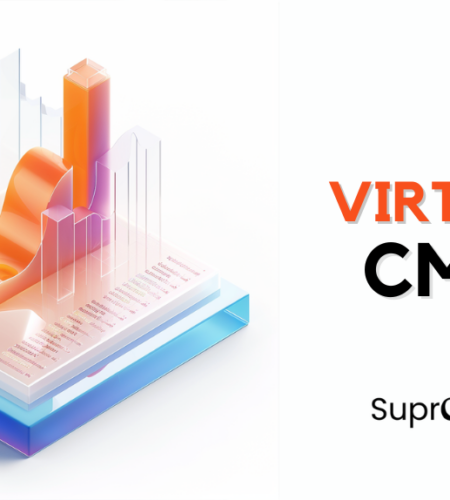
As businesses embrace the digital world, they are constantly looking for ways to gain a competitive edge. AI technology is one of the most promising tools for achieving this goal, which can help virtual CMOs drive business growth and innovation.
By leveraging the power of AI, virtual CMOs can analyze large amounts of data in real time to identify patterns and trends in customer behavior, market trends, and competitor activities. This can help businesses develop more effective marketing campaigns and stay ahead of the competition.
In addition to data analysis, AI can also enable personalized marketing campaigns. By analyzing customer data, virtual CMOs can create targeted marketing messages and content that resonate with specific customer segments, improving engagement and conversion rates.
Another way that virtual CMOs can leverage AI to drive business growth and innovation is through the use of automation and optimization.
Artificial Intelligence (AI) can significantly empower Virtual Chief Marketing Officers (CMOs) to drive business growth and innovation in multiple ways. By leveraging AI, Virtual CMOs can enhance their strategies, streamline operations, and deliver more personalized customer experiences, ultimately contributing to their businesses’ overall growth and innovation. Here’s how AI assists in this transformative journey:
Data-Driven Strategic Insights: AI excels in processing and analyzing vast amounts of data to uncover insights that might not be apparent to human analysts. For Virtual CMOs, this means having access to deep, actionable insights about market trends, consumer behaviors, and competitive landscapes, enabling them to develop more informed and strategic marketing plans that align with business growth objectives.
Predictive Analytics for Market Anticipation: AI’s capabilities allow Virtual CMOs to forecast future consumer behaviors, market demands, and trends. This foresight enables businesses to stay ahead of the curve, anticipate market shifts, and adapt their strategies proactively, ensuring sustained growth and relevance in their respective markets.
Enhanced Customer Personalization: AI enables hyper-personalization of marketing efforts at scale, allowing Virtual CMOs to tailor content, recommendations, and communications to individual customer preferences and behaviors. This level of personalization enhances customer engagement, improves conversion rates, and fosters loyalty, contributing to long-term business growth.
Optimized Marketing Campaigns: Through AI, Virtual CMOs can continuously optimize marketing campaigns in real-time, adjusting for maximum effectiveness based on ongoing performance data. This ensures that marketing budgets are utilized efficiently, yielding higher returns on investment and contributing to overall business profitability.
AI Acceleration: Empowering Virtual CMOs for Unprecedented Business Growth
As businesses continue to adapt to the digital landscape, the role of the CMO is becoming increasingly complex and vital. With the rise of AI technology, virtual CMOs can now leverage AI to drive unprecedented business growth.
AI acceleration is the key to empowering virtual CMOs to achieve this growth. By leveraging AI, virtual CMOs can analyze large amounts of data in real time, enabling them to identify patterns and trends that inform their marketing strategies. This can help businesses to develop more effective marketing campaigns and stay ahead of the competition.
The Rise of AI: Transforming Virtual CMOs from Support Role to Business Driver
As businesses continue to embrace AI technology, the role of virtual CMOs is evolving from a supporting role to a central driver of business success. With the ability to leverage AI to analyze data, enable personalized marketing, and automate and optimize marketing efforts, virtual CMOs are becoming a powerful tool for businesses seeking to drive growth and stay ahead of the competition.
In the past, CMOs were often seen as a supporting function within businesses, responsible for developing marketing campaigns and driving brand awareness. However, with the rise of AI, the role of virtual CMOs is expanding to include data analysis, personalized marketing, and automation and optimization.
Unleashing the Power of AI: Virtual CMOs Redefining Business Growth
As businesses continue to adapt to the digital landscape, the role of the CMO is evolving, and virtual CMOs, empowered by AI, are at the forefront of this transformation. With the ability to analyze data, enable personalized marketing, and automate and optimize marketing efforts, virtual CMOs are redefining the path to business growth.
One key way that virtual CMOs are redefining business growth is through data analysis. With AI technology, virtual CMOs can analyze large amounts of data in real time, allowing them to identify patterns and trends that can inform their marketing strategies. This enables businesses to develop more effective marketing campaigns and stay ahead of the competition.
AI-Driven Innovation: Virtual CMOs as Catalysts for Business Transformation
As businesses continue to embrace AI technology, the role of virtual CMOs, or chief marketing officers, is becoming increasingly important in driving growth and innovation. Virtual CMOs, or Chief Marketing Officers, can now leverage AI to analyze data, enable personalized marketing, and automate and optimize marketing efforts. This has allowed them to take on a more central role in businesses, helping to drive growth and transformation.
In the past, CMOs were often seen as a supporting function within businesses, responsible for developing marketing campaigns and driving brand awareness. However, with AI’s rise, virtual CMOs can now leverage AI to analyze data and develop more effective marketing strategies. This has allowed them to take on a more central role in businesses, helping to drive growth and transformation.
From Virtual Assistants to Virtual CMOs: AI’s Role in Driving Business Growth
The role of AI in marketing has evolved significantly in recent years. What started as a tool for automating routine tasks has now transformed into a powerful solution for driving business growth and innovation.
One of the key areas where AI has had a significant impact is virtual CMOs. By leveraging AI, businesses can now access a wide range of data-driven insights and personalized marketing capabilities that were previously unavailable. This has allowed virtual CMOs to take on a more central role in businesses, helping to drive growth and transformation.
In addition to its role in virtual CMOs, AI is also used to drive business growth in other ways. For example, AI-powered chatbots and virtual assistants are being used to provide personalized customer experiences and drive engagement. AI is also used to optimize marketing campaigns and improve targeting, allowing businesses to reach the right audience at the right time.
Futuristic Virtual CMOs: How AI is Redefining Business Strategy
Artificial intelligence (AI) is shaping the future of marketing, and virtual CMOs are at the forefront of this transformation. With the ability to analyze data, enable personalized marketing, and automate and optimize marketing efforts, virtual CMOs are redefining the role of the CMO and driving growth and innovation in businesses.
As AI technology continues to evolve, virtual CMOs will become even more capable and powerful. They will be capable of not only analyzing data and enabling personalized marketing but also developing and implementing new growth strategies. This shift will require businesses to adapt and embrace AI technology to remain competitive in the digital landscape.
The AI Advantage: Virtual CMOs at the Forefront of Business Innovation
In today’s digital age, businesses increasingly turn to AI-powerusetions to drive growth and innovation. One of the most significant areas where AI has a major impact is virtual CMOs or Chief Marketing Officers.
Virtual CMOs are at the forefront of AI-driven business innovation. By leveraging AI, they can analyze large amounts of data, real-time, identify patterns and trends, and develop personalized marketing campaigns that drive engagement and conversion. This has allowed virtual CMOs to become influential business growth and innovation drivers.
One of the key benefits of virtual CMOs is their ability to provide businesses with a deeper understanding of their customers.
Conclusion:
The potential for AI to drive business growth and innovation is vast, and virtual CMOs are well-positioned to leverage this technology to achieve their goals.
By using AI to analyze data, enable personalized marketing, and automate and optimize marketing efforts, virtual CMOs can help businesses stay ahead of the competition, increase customer engagement and conversion rates, and drive growth.
As businesses continue to embrace the digital world, the role of virtual CMOs will become increasingly important, and those that can effectively leverage AI will be well-positioned to succeed in the increasingly competitive and complex marketing world.
How AI Can Help Virtual CMOs Drive Business Growth and Innovation: FAQs
How Can AI Support Virtual CMOs In Driving Business Growth?
AI empowers virtual CMOs with predictive insights, automation tools, and real-time analytics to optimize strategies and uncover new growth opportunities.
What Role Does AI Play In Enhancing Marketing Innovation?
AI introduces innovation through intelligent automation, personalized customer experiences, rapid experimentation, and faster go-to-market executions.
Can AI Help Virtual CMOs Make Better Strategic Decisions?
AI analyzes large volumes of data to reveal patterns, customer behaviors, and performance trends that guide more informed decision-making.
How Do Virtual CMOs Use AI For Customer Segmentation?
AI segments audiences based on behavior, demographics, and engagement, enabling hyper-targeted messaging that increases conversions and loyalty.
How Does AI Accelerate Campaign Testing And Optimization?
AI tools run A/B tests, analyze results in real-time, and adjust creative, bidding, or targeting strategies automatically for maximum impact.
Can AI Help Identify Untapped Market Opportunities?
Absolutely. AI scans market data, competitor trends, and consumer signals to discover new audience segments and product positioning angles.
What Is The Impact Of AI On Personalization Strategies?
AI enables scalable personalization by tailoring content, recommendations, and offers based on user preferences and interactions.
How Do Virtual CMOs Integrate AI Into Growth Marketing Funnels?
They use AI for lead scoring, nurturing, funnel analysis, and conversion prediction, streamlining the path from awareness to revenue.
What are some examples of AI tools used by virtual CMOs?
Examples include Jasper for content creation, HubSpot AI for automation, ChatGPT for ideation, and Salesforce Einstein for predictive analytics.
Can AI Help With Content Strategy And Innovation?
Yes, AI assists in content ideation, keyword discovery, topic clustering, performance forecasting, and generating written and visual assets.
How Does AI Improve Budget Allocation Decisions?
AI analyzes cross-channel performance and user behavior to recommend real-time budget shifts toward high-performing tactics and platforms.
What Is The Relationship Between AI And Agile Marketing?
AI supports agile marketing by offering faster feedback loops, enabling real-time adjustments, and facilitating quick experimentation with less risk.
How Can Virtual CMOs Use AI To Innovate In Product Marketing?
AI helps test product-market fit, personalize feature messaging, analyze user feedback, and optimize launch campaigns for innovation success.
Does AI Enhance Cross-Department Collaboration?
By offering centralized insights and customer data, AI helps marketing align more effectively with sales, product, and customer success teams.
How Do AI-Powered Insights Contribute To Long-Term Growth?
They guide strategic planning by revealing customer lifetime value, churn predictors, brand sentiment, and high-value segments over time.
Can AI Predict Market Shifts And Competitive Movements?
AI monitors real-time industry data and competitor actions to forecast market disruptions, emerging trends, and innovation windows.
How Do Virtual CMOs Use AI For Customer Experience Innovation?
They apply AI to personalize journeys, predict needs, automate touchpoints, and enhance satisfaction through anticipatory service.
What KPIs Can Be Improved Through AI-Driven Growth Strategies?
Key metrics include customer acquisition cost (CAC), lifetime value (CLV), conversion rate, retention rate, and marketing ROI.
How Does AI Help Scale Campaigns Without Increasing Headcount?
AI automates repetitive processes like ad management, segmentation, and reporting, enabling teams to do more with less.
What Future Trends Will Shape AI And Virtual CMO Collaboration?
Trends include generative AI for branding, autonomous campaign orchestration, AI-driven strategy dashboards, and voice-of-customer modeling.


Comments